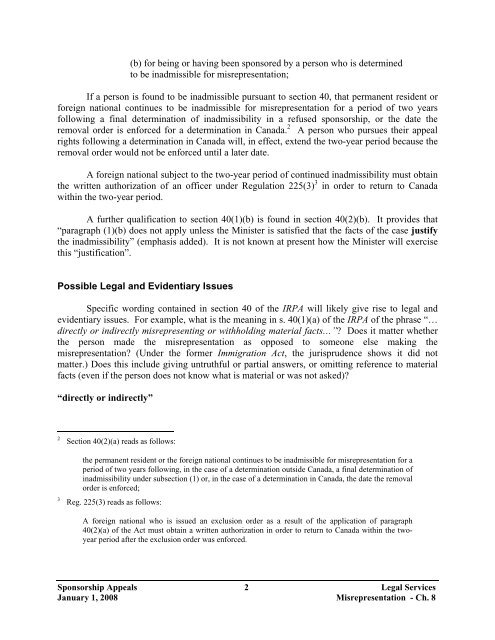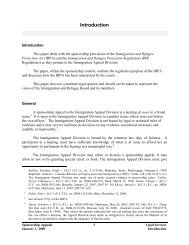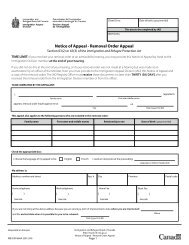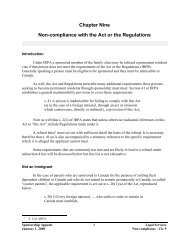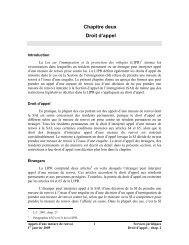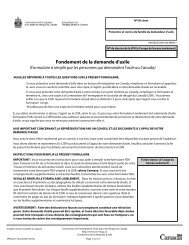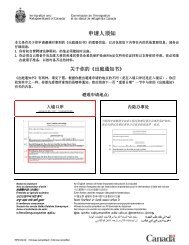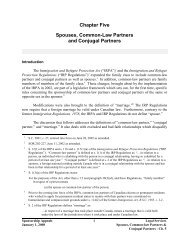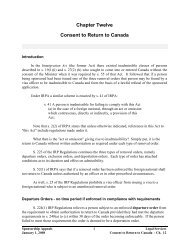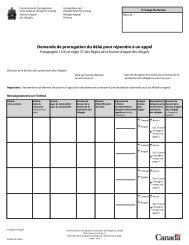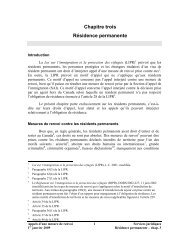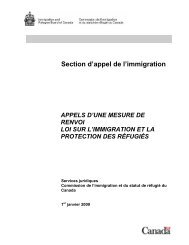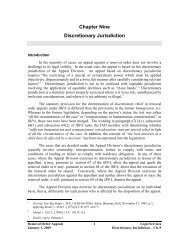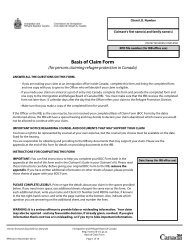Misrepresentation - Immigration and Refugee Board of Canada
Misrepresentation - Immigration and Refugee Board of Canada
Misrepresentation - Immigration and Refugee Board of Canada
You also want an ePaper? Increase the reach of your titles
YUMPU automatically turns print PDFs into web optimized ePapers that Google loves.
(b) for being or having been sponsored by a person who is determined<br />
to be inadmissible for misrepresentation;<br />
If a person is found to be inadmissible pursuant to section 40, that permanent resident or<br />
foreign national continues to be inadmissible for misrepresentation for a period <strong>of</strong> two years<br />
following a final determination <strong>of</strong> inadmissibility in a refused sponsorship, or the date the<br />
removal order is enforced for a determination in <strong>Canada</strong>. 2 A person who pursues their appeal<br />
rights following a determination in <strong>Canada</strong> will, in effect, extend the two-year period because the<br />
removal order would not be enforced until a later date.<br />
A foreign national subject to the two-year period <strong>of</strong> continued inadmissibility must obtain<br />
the written authorization <strong>of</strong> an <strong>of</strong>ficer under Regulation 225(3) 3 in order to return to <strong>Canada</strong><br />
within the two-year period.<br />
A further qualification to section 40(1)(b) is found in section 40(2)(b). It provides that<br />
“paragraph (1)(b) does not apply unless the Minister is satisfied that the facts <strong>of</strong> the case justify<br />
the inadmissibility” (emphasis added). It is not known at present how the Minister will exercise<br />
this “justification”.<br />
Possible Legal <strong>and</strong> Evidentiary Issues<br />
Specific wording contained in section 40 <strong>of</strong> the IRPA will likely give rise to legal <strong>and</strong><br />
evidentiary issues. For example, what is the meaning in s. 40(1)(a) <strong>of</strong> the IRPA <strong>of</strong> the phrase “…<br />
directly or indirectly misrepresenting or withholding material facts…”? Does it matter whether<br />
the person made the misrepresentation as opposed to someone else making the<br />
misrepresentation? (Under the former <strong>Immigration</strong> Act, the jurisprudence shows it did not<br />
matter.) Does this include giving untruthful or partial answers, or omitting reference to material<br />
facts (even if the person does not know what is material or was not asked)?<br />
“directly or indirectly”<br />
2<br />
3<br />
Section 40(2)(a) reads as follows:<br />
the permanent resident or the foreign national continues to be inadmissible for misrepresentation for a<br />
period <strong>of</strong> two years following, in the case <strong>of</strong> a determination outside <strong>Canada</strong>, a final determination <strong>of</strong><br />
inadmissibility under subsection (1) or, in the case <strong>of</strong> a determination in <strong>Canada</strong>, the date the removal<br />
order is enforced;<br />
Reg. 225(3) reads as follows:<br />
A foreign national who is issued an exclusion order as a result <strong>of</strong> the application <strong>of</strong> paragraph<br />
40(2)(a) <strong>of</strong> the Act must obtain a written authorization in order to return to <strong>Canada</strong> within the twoyear<br />
period after the exclusion order was enforced.<br />
Sponsorship Appeals 2 Legal Services<br />
January 1, 2008 <strong>Misrepresentation</strong> - Ch. 8


